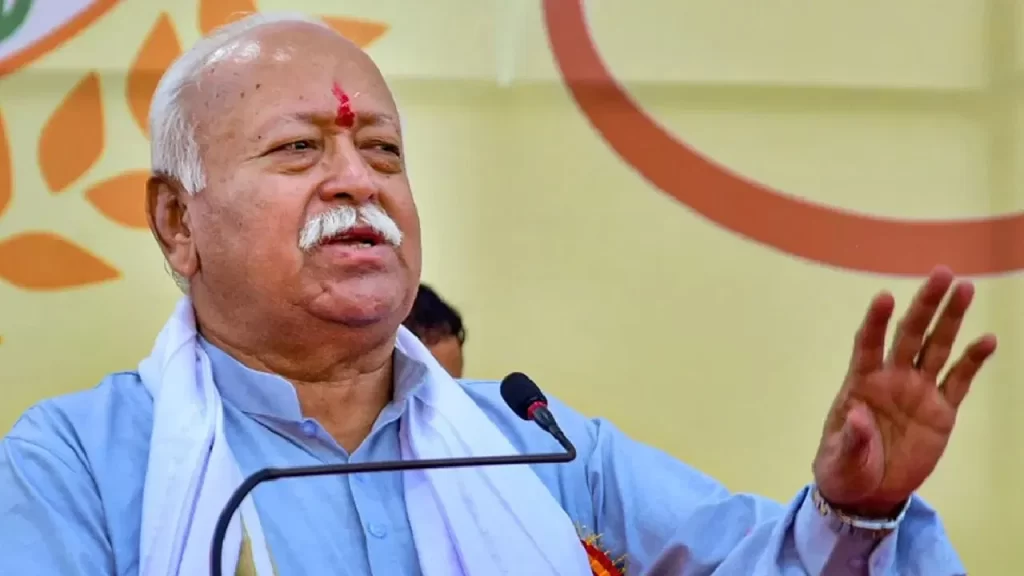By Najmuddin A Farooqi
In recent history, rarely have we witnessed such a significant and vocal presence of sadhus and sants in the media as in recent days. A spectrum of religious leaders, including many lesser-known figures, has spoken out regarding Rashtriya Swayamsevak Sangh (RSS) chief Mohan Bhagwat’s comments on Hindu places of worship allegedly destroyed and converted into mosques by Muslim rulers. While some voices supported Bhagwat, a significant majority of sants have vocally opposed his statements.
For the first time in its nearly century-old history, the RSS finds its leadership questioned so openly and with such intensity. Even mainstream media appears caught in a difficult position, unsure of how to navigate the controversy. Their typical tactic bringing an obscure individual with a Muslim name into the debate to divert attention has become their go to move. However, it is critical for Indian Muslims to stay resolute, maintain silence, and refrain from participating in such discussions. The media’s bias against minorities often goes unchallenged, and their attempts to pull Muslims into this debate only serve to obscure the real issues.
The Hindutva brigade, for the most part, has avoided public airing of internal disagreements. However, the current situation has brought an unexpected level of discomfort and public embarrassment. Bhagwat’s speech was no offhand remark it carried significant weight. The RSS, often regarded as the lifeblood of the BJP-led political dispensation, rarely allows such statements to be dismissed lightly. For context, a report published in The Economic Times just before the BJP’s landslide victory in 2014 revealed that the RSS had trained 2,000 committed members to take key positions in governance under a Modi-led government.
The RSS has long been the central pillar of the Sangh Parivar, also referred to as the Hindutva Parivar by the public. Over the decades, it has produced a lineage of prominent leaders, from Deendayal Upadhyay and Shyama Prasad Mukherjee to Atal Bihari Vajpayee, L.K. Advani, and Narendra Modi. To its adherents, the RSS symbolizes nationalism “Bhartiyata”(Indianness). It is also seen as the guardian of Sanatani Hindu values and commands widespread respect, even within the sant community. However, exceptions like the Arya Samaj a micro-minority of roughly 8 million adherents exist. Despite being a loosely organized body, the RSS boasts the largest cadre-based network in India and within the Indian diaspora. Its affiliated organizations, such as the Bharatiya Janata Party (BJP), Akhil Bharatiya Vidyarthi Parishad, Vishwa Hindu Parishad (VHP), and Bajrang Dal, wield significant influence across diverse domains.
The notion of a “Sant Parivar” as a parallel to the Sangh Parivar is, at best, ambiguous. If Bhagwat’s remarks were made independently of government alignment, it signals potential discord within the Parivar perhaps a rift between Modi’s administration and the Sangh leadership. On the other hand, if Bhagwat’s voice echoes the government’s intent, it could signify a shift or a new direction within the Hindutva discourse.
The name “Ram” holds immense significance in Hindu consciousness, representing noble virtues and spiritual identity. The Ayodhya movement, centered around Lord Ram, stands as one of the longest and most impactful socio-political movements in modern Indian history. It united the Sanatani Hindu community like never before, transforming the BJP from a political nonentity into a dominant force with over 300 parliamentary seats and multiple state governments under its control.
However, the current discourse around Kashi and Mathura lacks the same resonance as the Ayodhya movement. These issues have not been officially endorsed by the BJP, nor do they seem capable of generating similar momentum. In the vacuum created by the lack of official backing, fringe Hindu groups are trying to assert themselves, seeking to preserve their relevance in an era of competitive Hindutva.
The sant community, while influential, does not command the same grassroots reach and organizational depth as the RSS. Bhagwat’s widespread cadre-based influence across the country far outweighs the impact of individual religious leaders. It is, therefore, crucial to understand that the RSS remains the central force in shaping Hindutva discourse.
An anecdote from Karnataka Pranth Pracharak Mukund, shared in a local daily, encapsulates the Sangh’s guiding philosophy. When a swayamsevak once asked Deendayal Upadhyay if power could corrupt Jana Sangh leaders, Deendayal acknowledged the possibility but emphasized that the RSS would remain a corrective force. “If the political party started by the Sangh gets corrupt, the Sangh has the power to destroy it,” he said. This illustrates the RSS’s central role as a self-regulating force within the Sangh Parivar.
Mainstream media’s long-standing practice of inviting token Muslim voices into pre-scripted debates is a well-known tactic to neutralize and divert attention from pressing issues affecting the community. Indian Muslims, at least in this instance, must exercise caution and let the internal dynamics of the Hindu community play out without interference. Sections of Hindu society are already engaging in their own introspection and course correction.
The current controversy offers an opportunity for necessary course correction within the Sangh Parivar. The BJP, as the political arm of the RSS, must respond to the ideological and organizational challenges it faces. Whether this results in a stronger consolidation of Hindutva forces or the emergence of new divisions remains to be seen. For now, the unfolding debate underscores the evolving complexities within the Hindutva ecosystem and the enduring influence of the Sangh.
The discourse sparked by Mohan Bhagwat’s speech highlights not just the ideological war within the Sangh Parivar but also the larger challenges of navigating India’s complex socio-political landscape. While the sant community has voiced dissent, the RSS’s structural depth and historical significance ensure its centrality in the Hindutva narrative. For the BJP and the Sangh, these debates serve as both a challenge and an opportunity to reassess their strategy and vision for the future. At the same time, Indian Muslims must remain vigilant, avoiding entanglement in debates designed to distract from genuine issues. In the end, the Sangh Parivar’s ability to address these internal and external challenges will determine its trajectory in the years to come.
